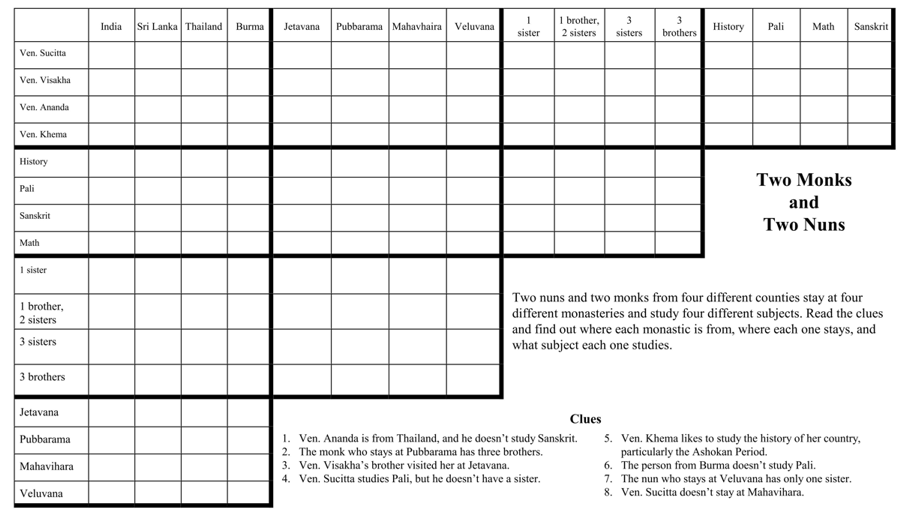 Praise and Blame, June 3, 2014
Praise and Blame, June 3, 2014 Praise and Blame, June 3, 2014
Praise and Blame, June 3, 2014
 Recently, our classes have been particularly rewarding. Since the intensive course in January, we have spent quite a few lessons developing critical thinking skills. We began with simple, but challenging, exercises, such as grouping and sequencing. Then we proceeded to analogies and logic puzzles. We were pleased at how quickly some of the students were able to analyze the facts, make connections, and solve the problems. Once they learn not to jump to conclusions, to proceed by ruling things out, they make quick progress. Of course, since our students are all monks, nuns, and novices, we try to include as much Buddhist content as possible in the exercises.
Recently, our classes have been particularly rewarding. Since the intensive course in January, we have spent quite a few lessons developing critical thinking skills. We began with simple, but challenging, exercises, such as grouping and sequencing. Then we proceeded to analogies and logic puzzles. We were pleased at how quickly some of the students were able to analyze the facts, make connections, and solve the problems. Once they learn not to jump to conclusions, to proceed by ruling things out, they make quick progress. Of course, since our students are all monks, nuns, and novices, we try to include as much Buddhist content as possible in the exercises.
Our two classes are very different. In the advanced class of international monks and nuns, we try to pair students with different first languages so that each pair must work through the arguments, discuss the problem, and defend their answers, all in English. In the class of Sri Lankan novices, we work together, but the older, more proficient ones take responsibility for guiding the younger novices and temple boys. It is quite satisfying when, after completing a particularly challenging exercise, they cry, "Easy!" We can feel their sense of accomplishment, which is much more than simply learning English.
 The other day, after one class had almost effortlessly deciphered a coded message, simply by approaching it with logic, we commented that, although they could whip through an exercise in fifteen minutes, it sometimes took us about six hours to create it. One student replied, "You should make a book!" Maybe we should. Our portfolio of Buddhism-related activities is growing rapidly. Some of it is class material for a teacher to direct, but a lot of it is suitable for self-study. Maybe there are actually two books! In any case, it is fun to create these materials, and it is even more fun to watch students enjoy them.
The other day, after one class had almost effortlessly deciphered a coded message, simply by approaching it with logic, we commented that, although they could whip through an exercise in fifteen minutes, it sometimes took us about six hours to create it. One student replied, "You should make a book!" Maybe we should. Our portfolio of Buddhism-related activities is growing rapidly. Some of it is class material for a teacher to direct, but a lot of it is suitable for self-study. Maybe there are actually two books! In any case, it is fun to create these materials, and it is even more fun to watch students enjoy them.
Logic and critical thinking led naturally into a consideration of fallacies, that is, bad arguments, noticeably in news articles. Coming from Buddhist backgrounds, our students were surprised to learn that many westerners take creationism seriously and reject not only the theory of evolution, but also all the evidence of global warming and climate change. We found an article which discussed these issues and advocated the necessity of using critical thinking to distinguish belief from science. This, of course, led to an examination of The Kalama Sutta, in which the Buddha advised the Kalamas not to accept anything as truth just because it came from any of ten dubious sources, which include tradition, hearsay, scriptures, and the idea that "He is my teacher."
Some of our students have a tendency to believe that a Pali quotation or a truism like "If everybody followed Buddha's advice, there would be no problems" is enough to settle a disagreement. In a community where the Sangha are highly respected, they are not challenged to think through a problem and to consider the alternatives which will certainly arise when they encounter non-Buddhists. We want them to develop the ability to analyze issues critically, to keep an open mind, examine evidence and arguments, and be able to defend their conclusions.
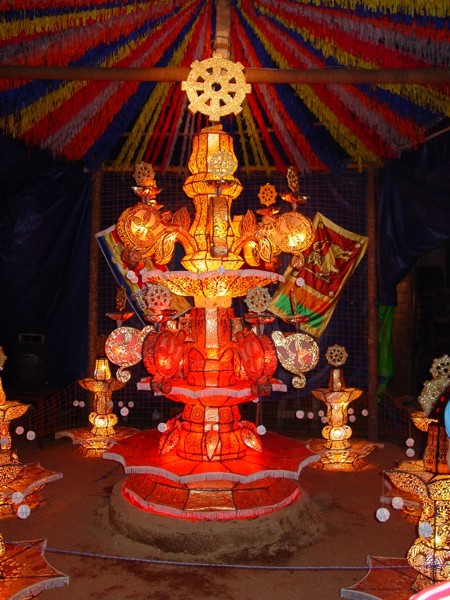 Vesak was about two weeks ago, but, here in Sri Lanka, it was much less coloful than ever before. Friends who toured Kandy to view the lanterns and pandals were disappointed that there were so few. It was a far cry from the spectacle we experienced in 2006.
Vesak was about two weeks ago, but, here in Sri Lanka, it was much less coloful than ever before. Friends who toured Kandy to view the lanterns and pandals were disappointed that there were so few. It was a far cry from the spectacle we experienced in 2006.
For us, it was a very quiet day. Mike joined us for a full day of meditation. It was wonderful. The new house can easily accommodate a large group. Twenty can comfortably sit in front of the altar, and there are numerous areas for walking–the porch, the yards, and the pavement at the foot of the stairs. There are also five bathrooms. Using the outdoor kitchen, Lily can prepare delicious meals for any number, and she does!
The happiest Vesak message came from a Chakma novice who recently went to India. When he was in our classes here, he was the best and brightest student we had, soaking up language and discussing Abhidhamma with a maturity far beyond his years. Although he had been in Sri Lanka for about nine years, he realized that he could neither get a good education not accomplish his goals as a monk here. He told us that, in India, he hoped to teach the Chakma community and to help their development. We suggested that, since he was going first to Mumbai, he consider how he might help the Dalit Buddhists as well. We were delighted when this message arrived:
|
My Vesak too went so wonderfully. I think I have done the biggest wholesome deed in my life on this Vesak day. It's kind of making a history I would say. Let me tell my story here.
All the villagers follow Buddhism, but there is no Buddhist temple or monk! My Upasaka told me that I was the first Buddhist monk to ever visit! The villagers were really happy to see me. They seemed innocent and eager to learn about Dhamma. I regretted not being able to speak Marati, but my Upasaka translated my English nicely. I taught them how to chant and how to practice Buddhism, as much as I could within one day. One surprising thing was that when women venerate a monk, they touch their forehead to our legs. I felt uncomfortable at first but later realized their intention was good and they thought they were blessed well. So I didn't mind their veneration.
That is what I did this Vesak, and I felt satisfied to have preached Lord Buddha's words to those villagers. I remember what Buddha said,"Caratha bhikkhave carika, bahujana hitaya, bahujana sukhaya". So I did it as a son of Buddha. I was struck, though, that there are still so many things they have to learn. I loved their eagerness, their curiosity, their desire to learn and know about Buddhism. Finally, whenever they see a Buddhist monk, they do not forget to say "Vandami Bhante" ... and they were so happy to have a Buddhist monk there.
With endless Metta, |
||||||||||
This reminded us of the enthusiasm we felt as we visited the Buddhists of Maharashtra with Venerable Pannasila. How exciting to think that that Chakma novice may also become involved with Ven. Pannasila's mission. Their combined efforts and energy could indeed by history-making!
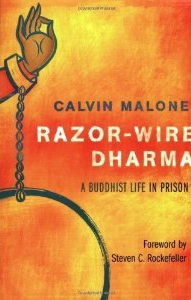 |
|
This letter just came from IBS:
|
Namo Buddhaya! First of all, many thanks to Buddhists in Singapore and Buddhist Relief Mission for this Dharma book donation. I am in Taiwan right now. I will let you know as soon as I know the shipping receiving information. IBS really appreciates your kind contribution for the IBS Prison Library Program. Without the support from generous people like you, it is impossible to spread the Dharma in the prisons. IBS has been conducting this program for 19 years. In 2010 IBS started to setup Buddhist libraries in different state prisons. There are 44 libraries so far in 15 different institutions. There are 36 state prisons in CA. IBS will try our best to setup libraries in all prisons in California gradually. I am sure we will be able to make it happen since many wonderful people all over the world are supporting this program. On behalf of Buddhist brothers in Iron Temples I would like to thank you and Calvin Malone for this Dharma donation. Also hand-folded thanks to Jinxing for introducing our program to his friends. We are really honored to have him as an online volunteer for the IBS Prison Program. Again, Thanks a lot. With Metta Xianzhong Shi |
|
No sooner had we gotten that request than we got a letter from Calvin himself. He was released from "prison" last year, but he is still detained in a special holding center, pending trial to determine whether he can reenter society. His first trial resulted in a hung jury, which he regards as a step toward victory. The date for his second trial has been forwarded, and it will be held in a couple of months. He has faith in his attorney and a lot of support from his Buddhist teachers, so he is optimistic about the outcome, but, as he says, "One has to be careful, though, with juries. It could go either way."
 Calvin sent us the brochure for the 2014 SCC Buddhist Event, "Sangha." It sounds like a wonderful event with Dhamma talks, poetry readings, and meditation. In the facility garden, the Buddhist Group is planning to build a meditation pagoda with a lovely gazebo.
Calvin sent us the brochure for the 2014 SCC Buddhist Event, "Sangha." It sounds like a wonderful event with Dhamma talks, poetry readings, and meditation. In the facility garden, the Buddhist Group is planning to build a meditation pagoda with a lovely gazebo.
Calvin invites all Dhamma friends to join in building this gazebo. Click the photo to view the flyers with a complete description. From that page you can send a donation to us via PayPal, and we will forward it to Washington. Remember that all donations to Buddhist Relief Mission are tax deductible.
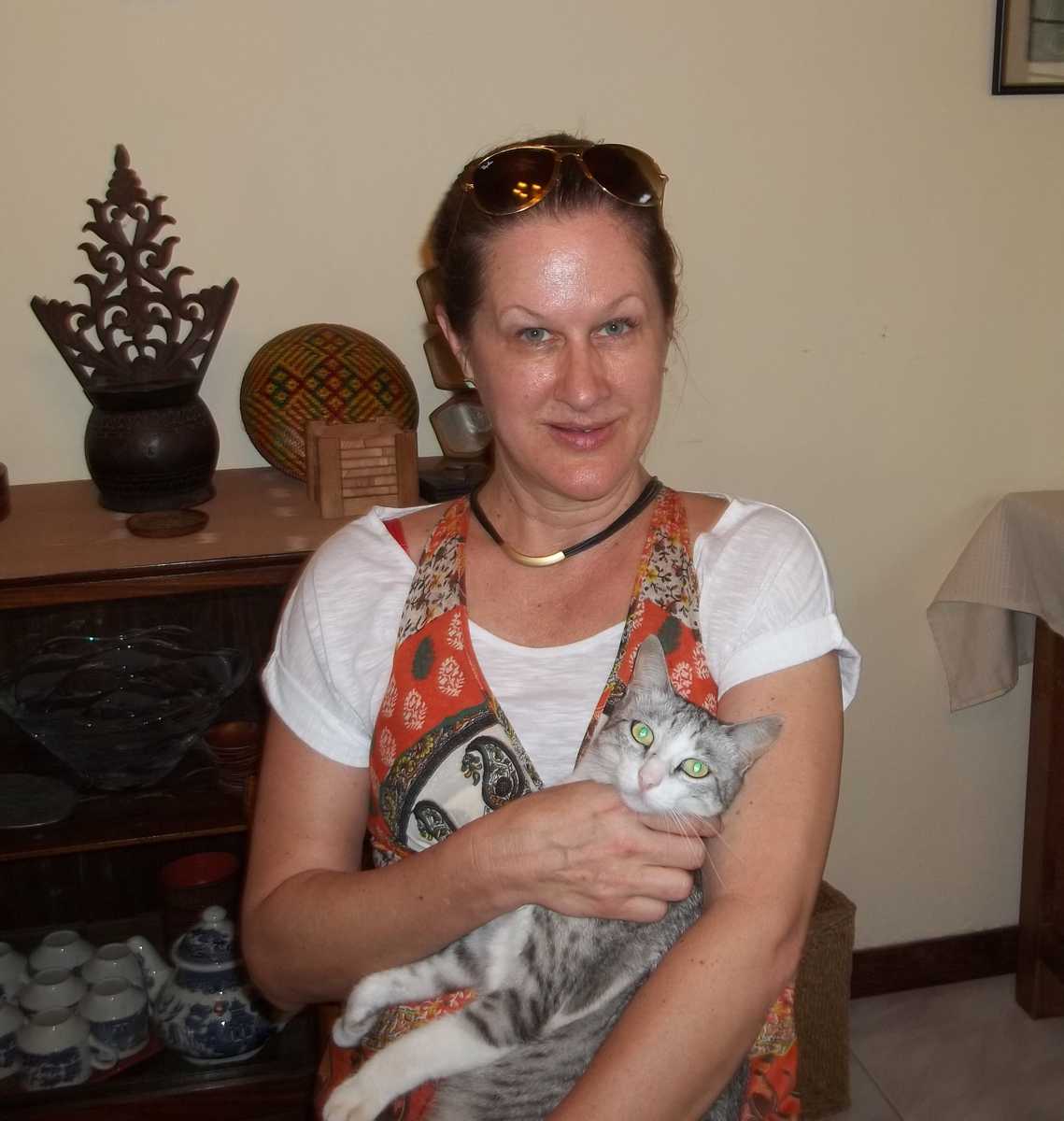 |
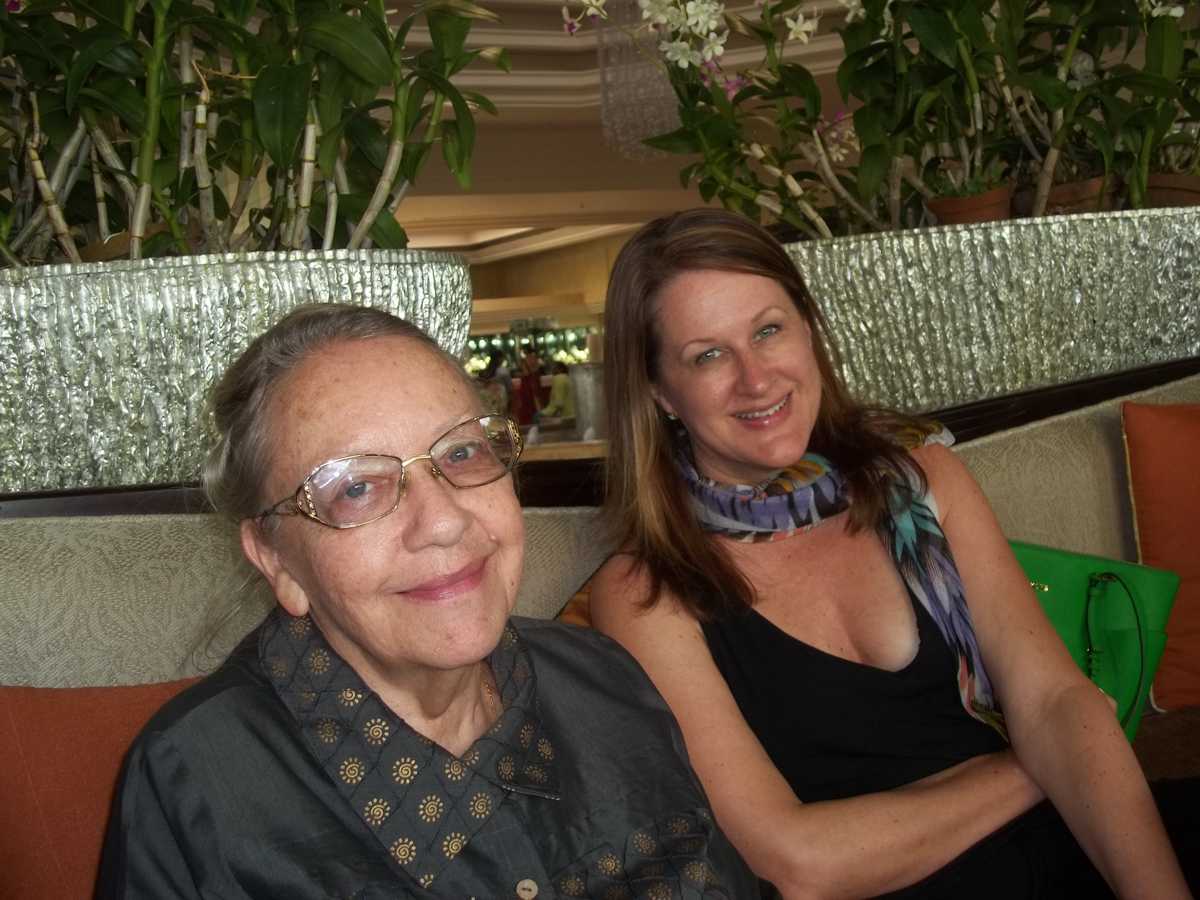 |
|
There was a massive outpouring of support for the well at Bodhirukarama in Kurunegala, where Ven. Amilasiri is caring for elderly monks. Donations far exceeded the amount he had asked for, so some of the funds have been used for food and medicine for the the monks. We hope to be able visit the monastery soon and to get photos of the well. One generous donor celebrated his mother's birthday with a meal for the monks at Bodhirukharama and donated one month's salary--18,000 rupees--for one of the caregivers.
The other day, after class at Subodharama, Ven. Pannavanna showed us photos of TJ, her nephew from Korea who had joined the intensive course in January. He is in Burma and has ordained. One of his teachers is Ven. Pannadikalankara, one of our former students, who returned to Burma about one year ago.
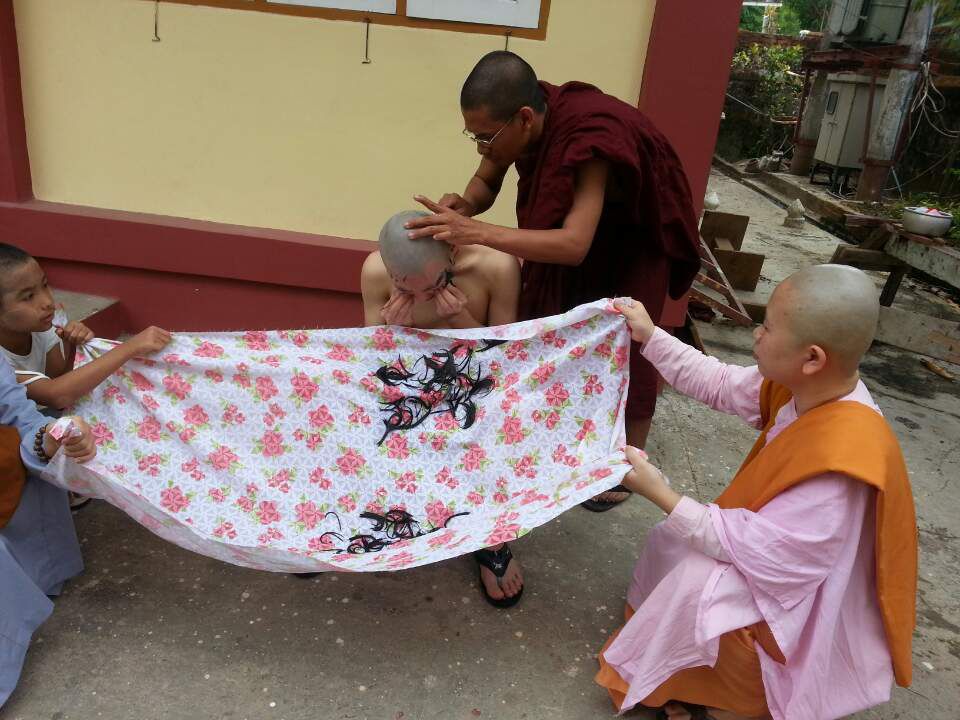 |
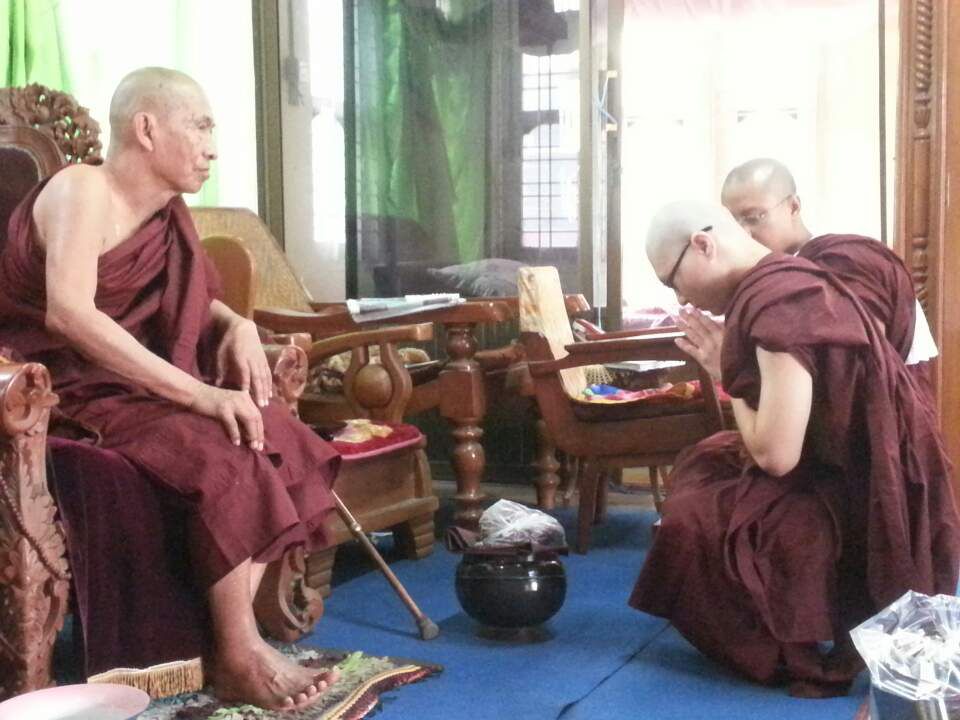 |
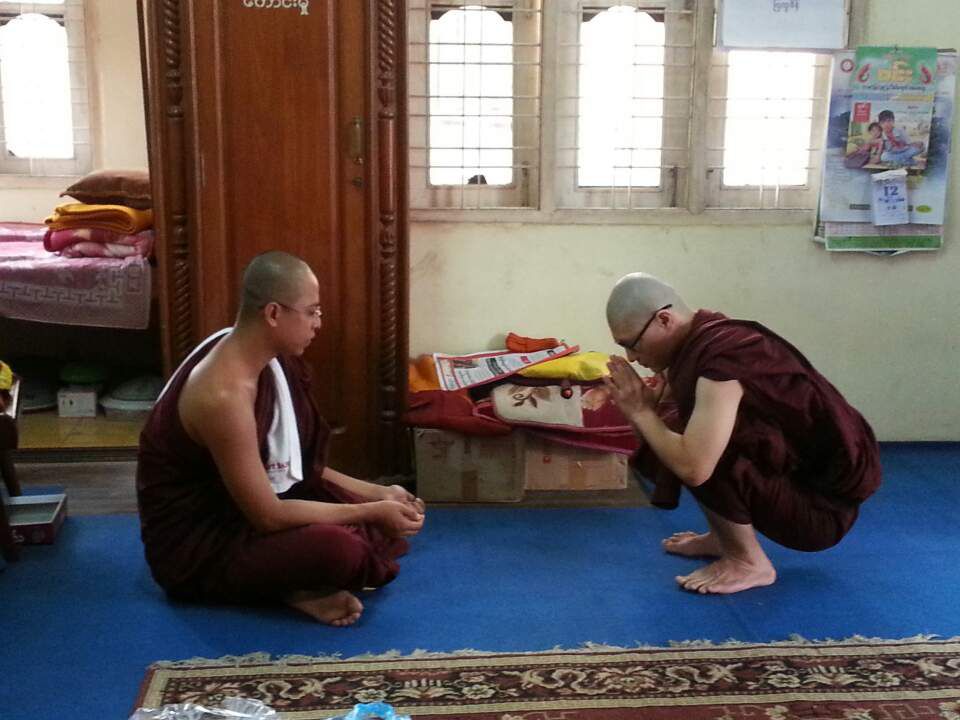 |
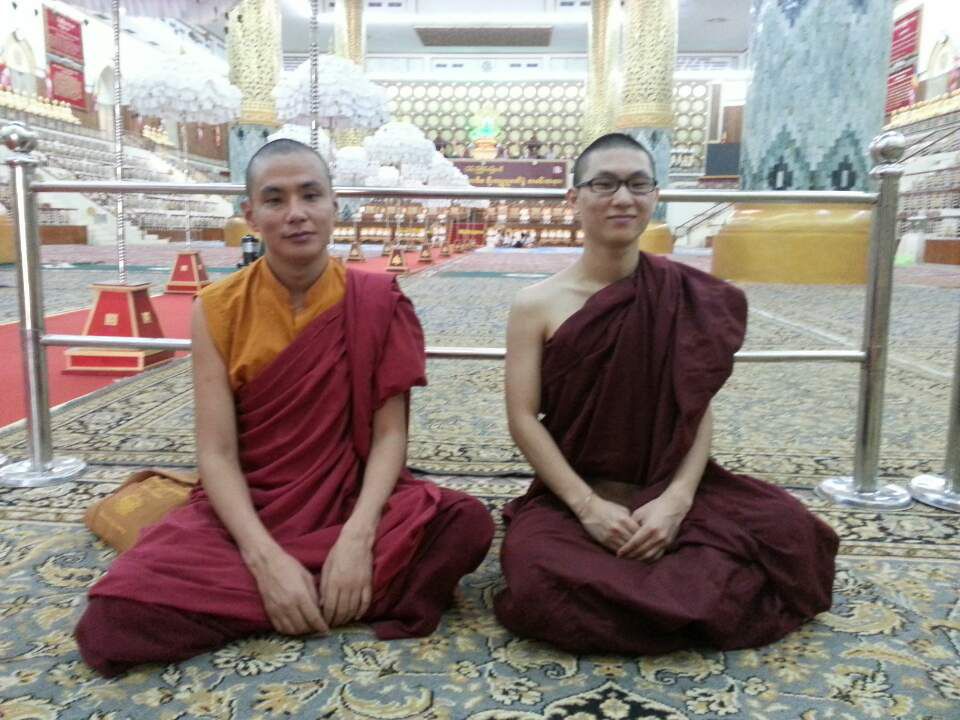 |
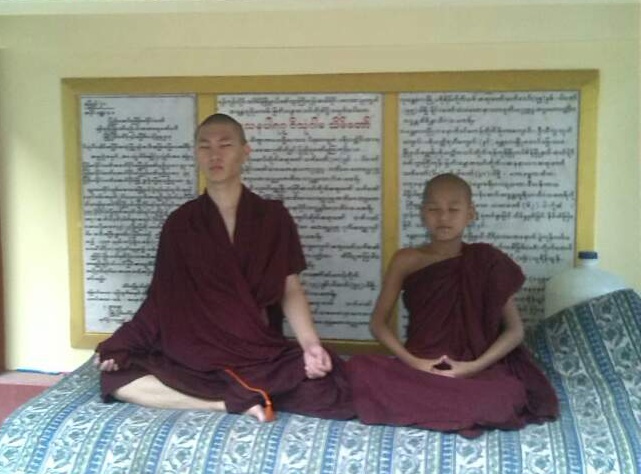 |
|
 |
|||
|
Click to enlarge
|
|||
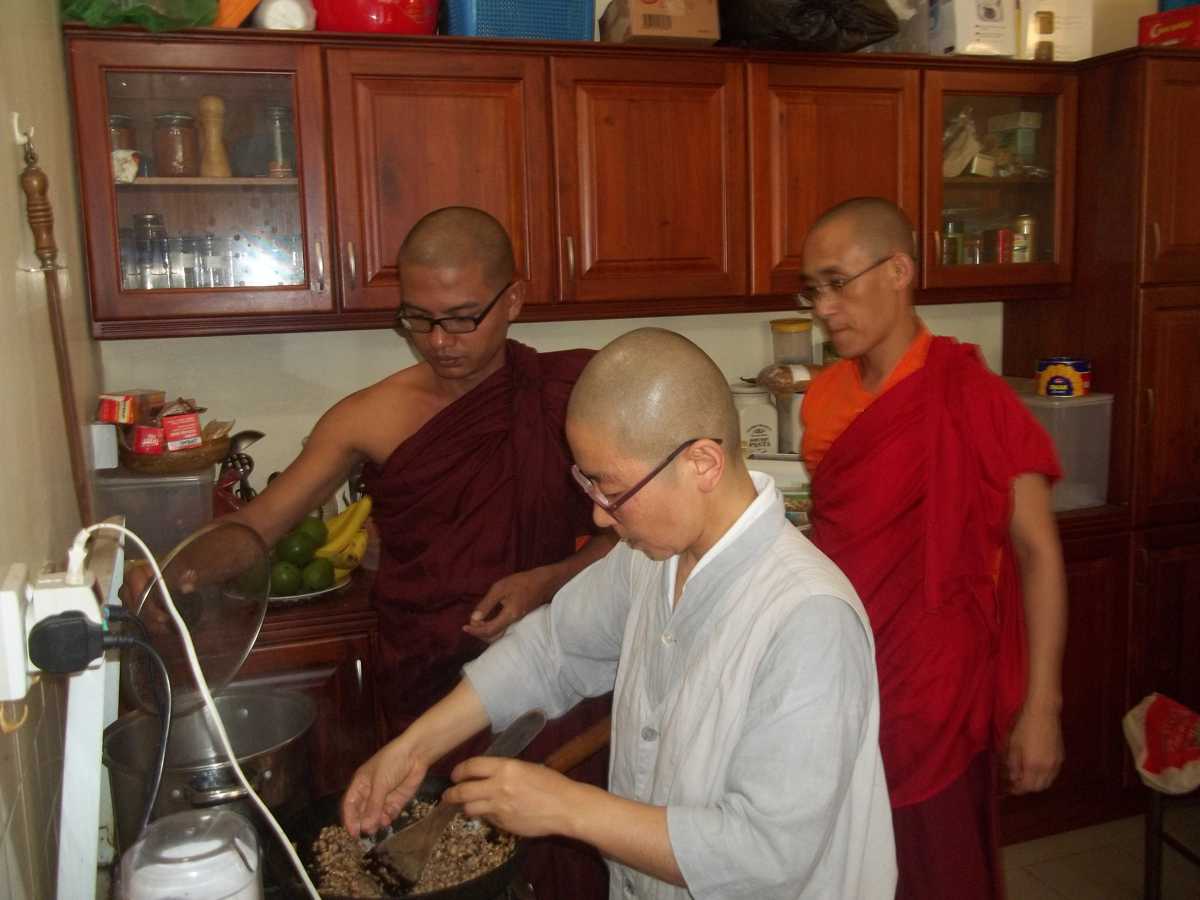 |
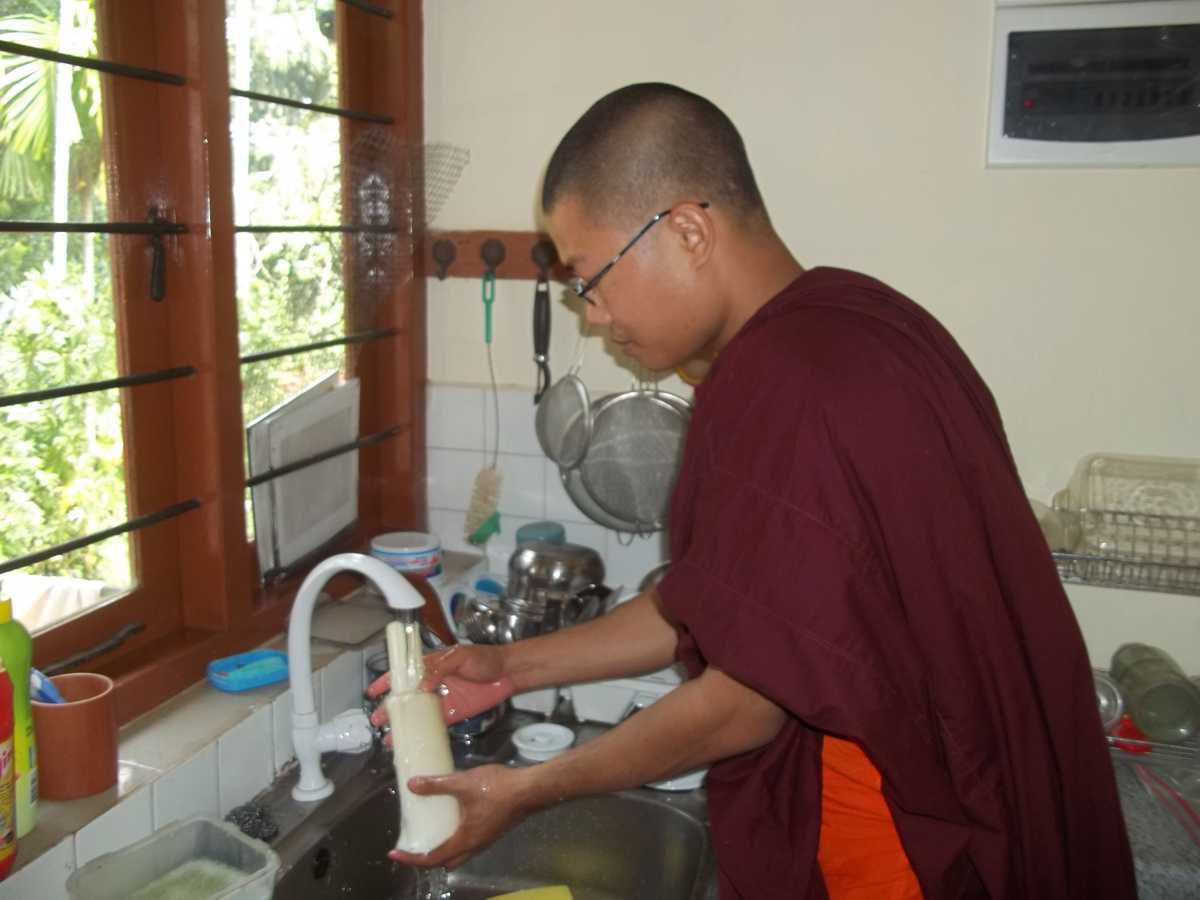 |
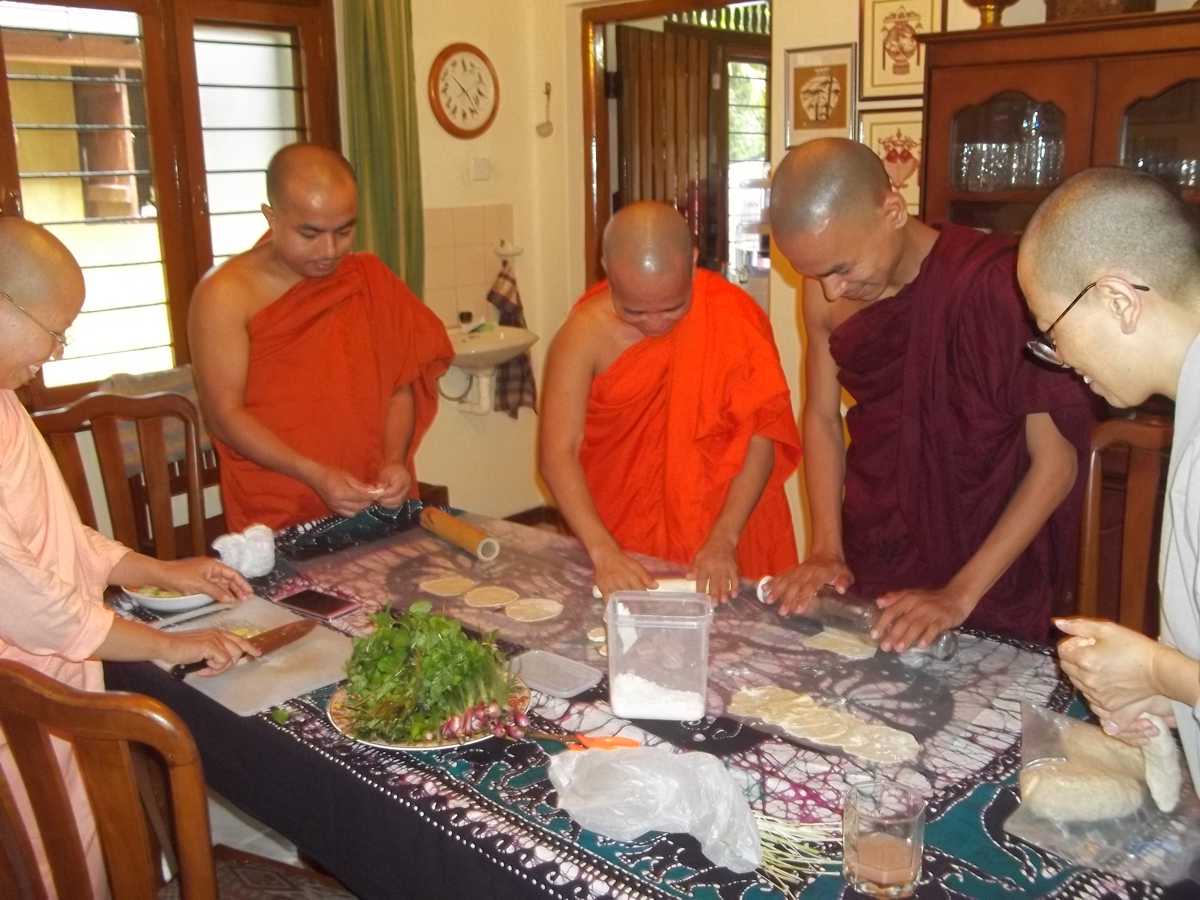 |
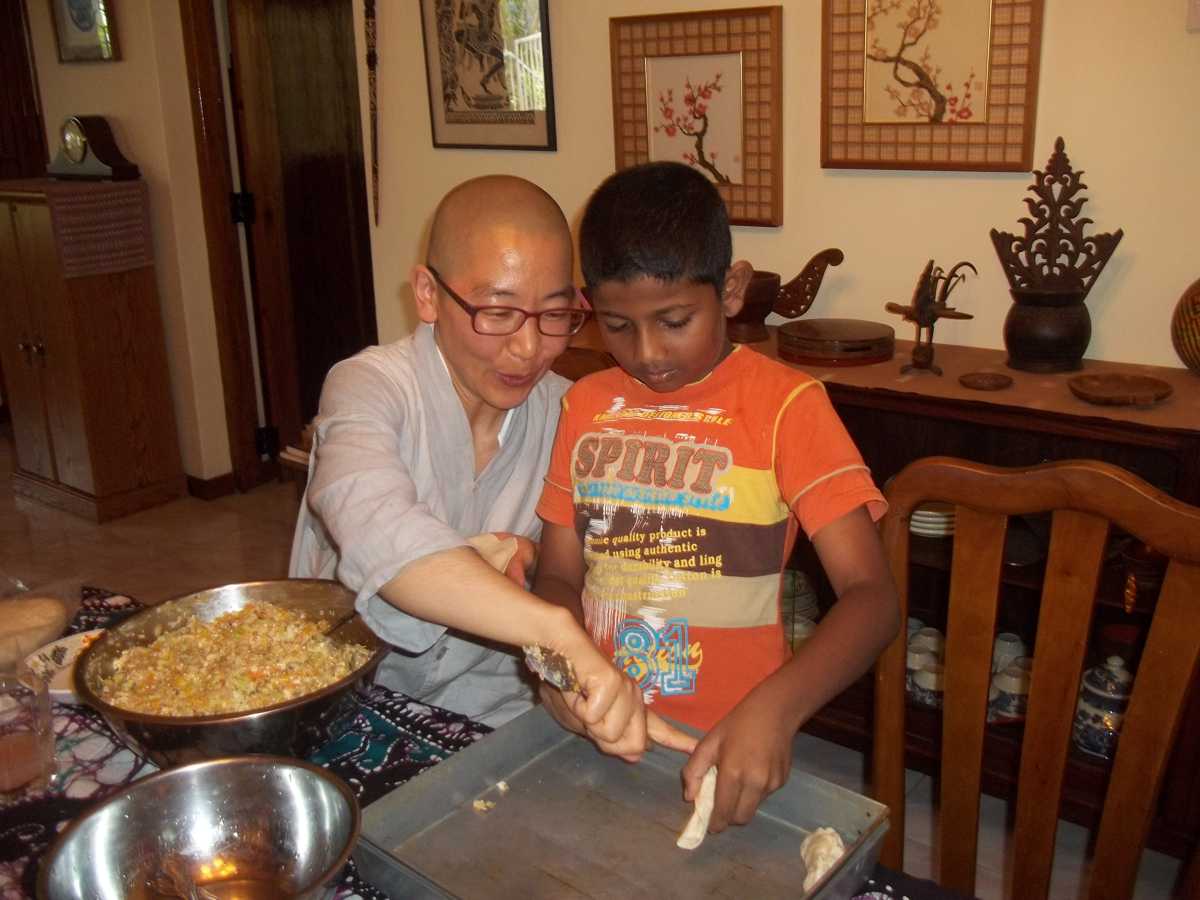 |
||||
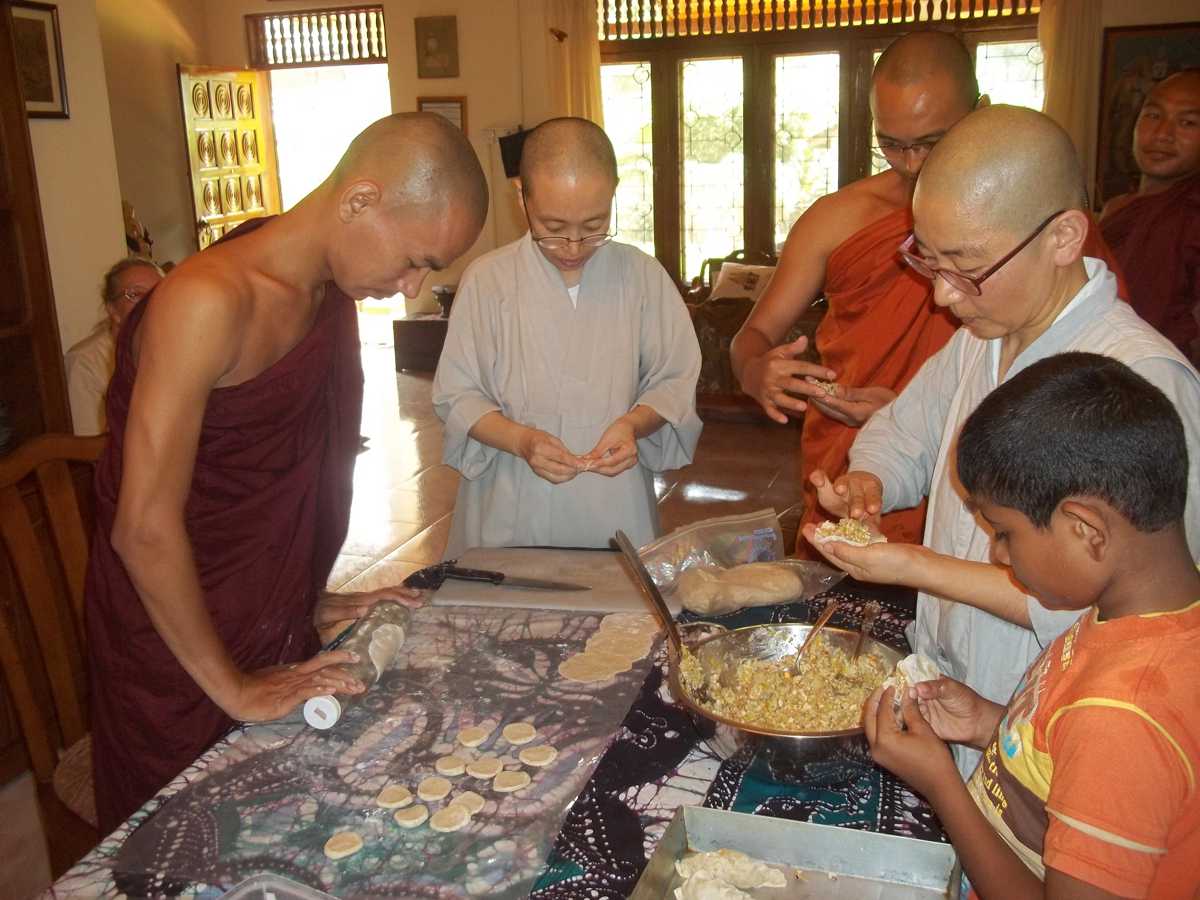 |
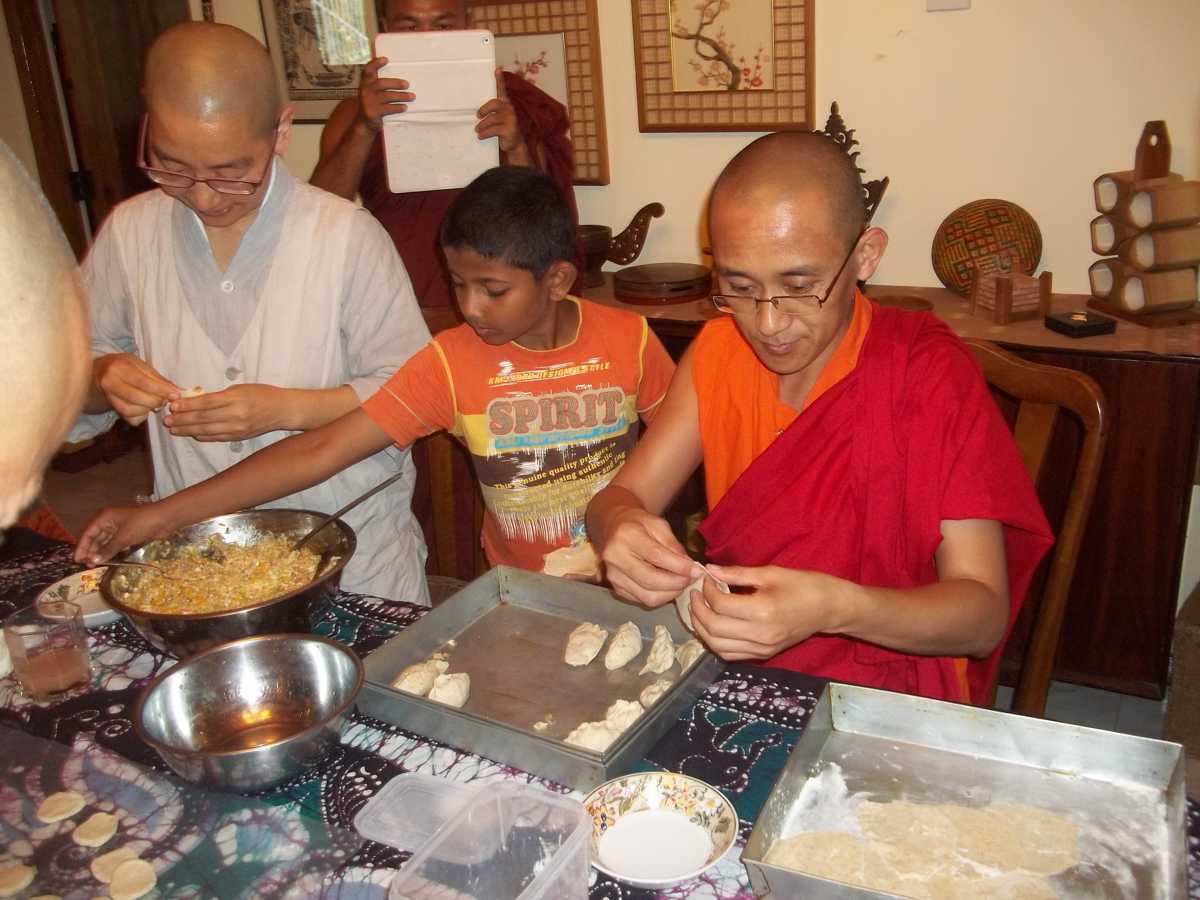 |
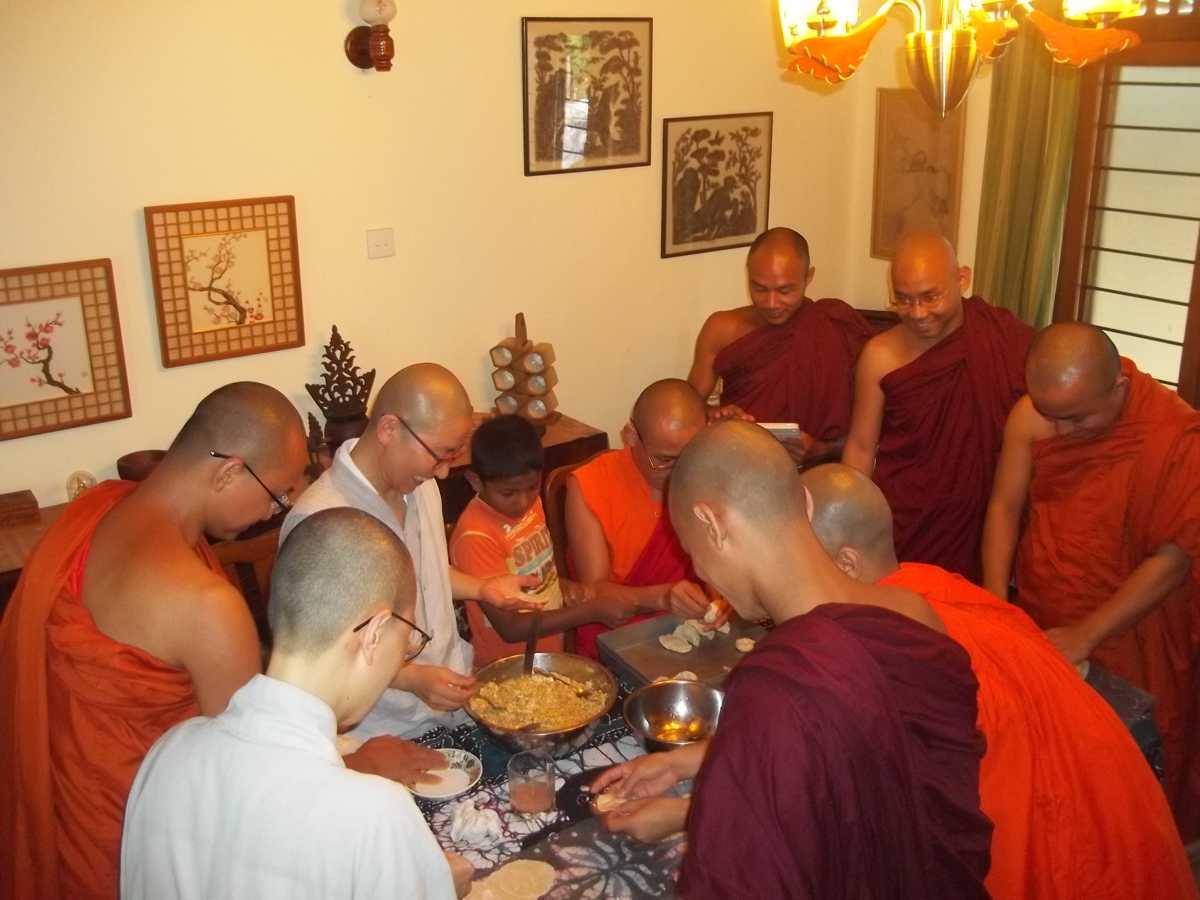 |
|||||
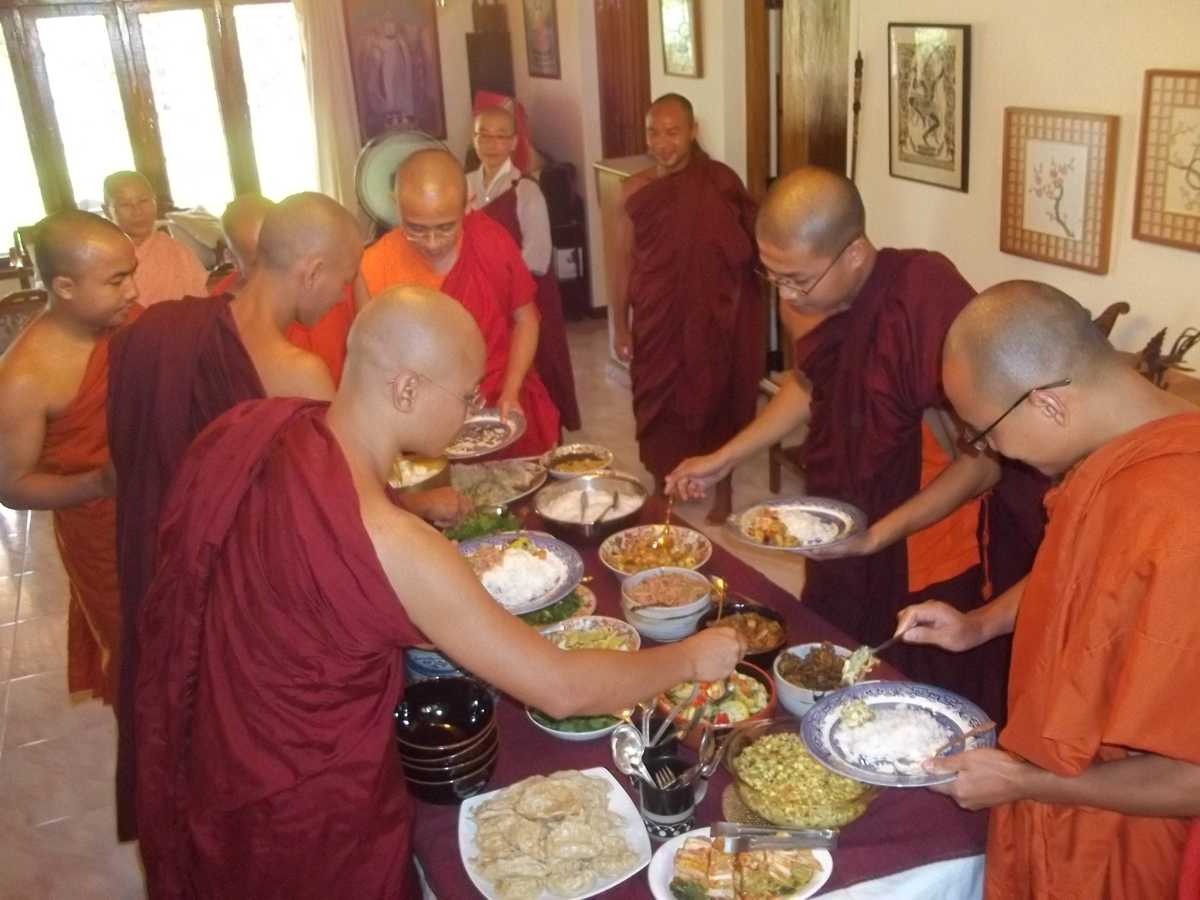 |
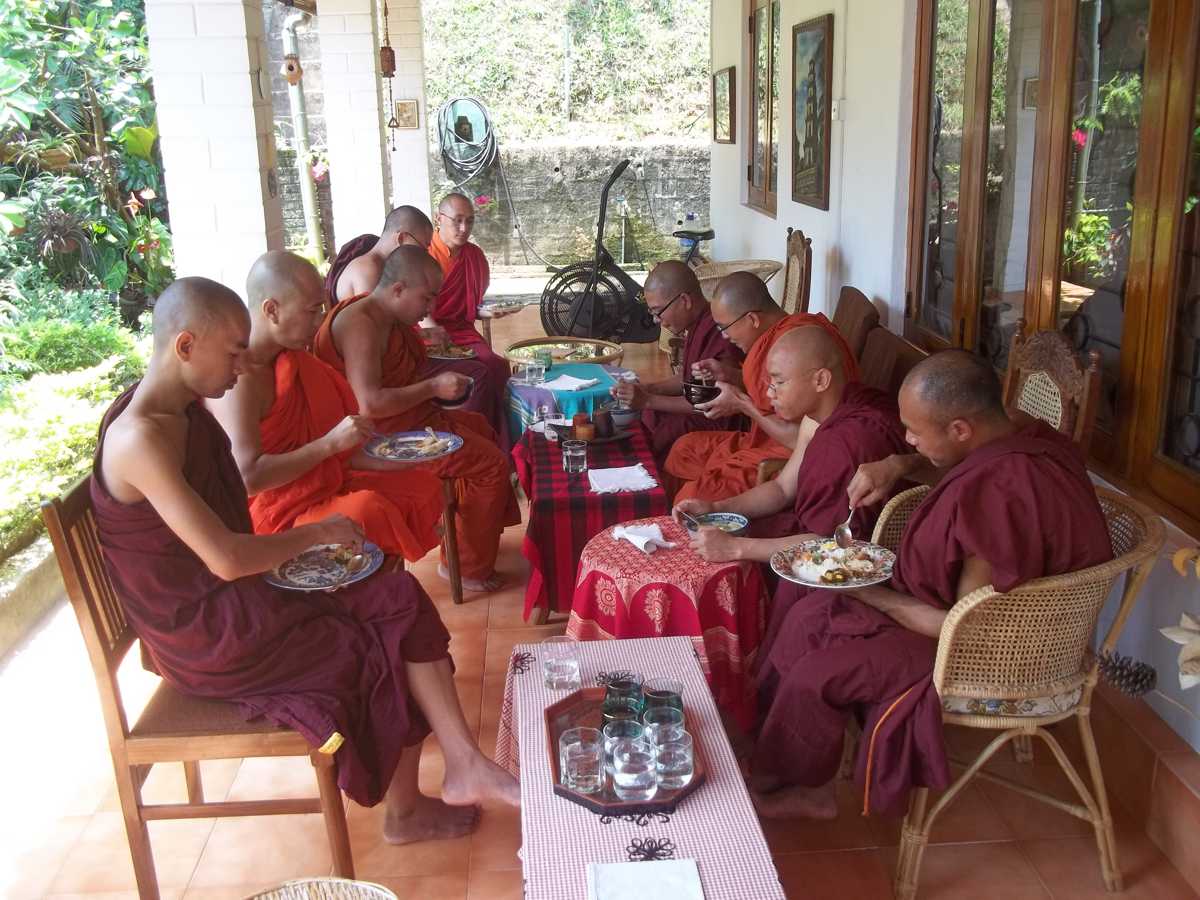 |
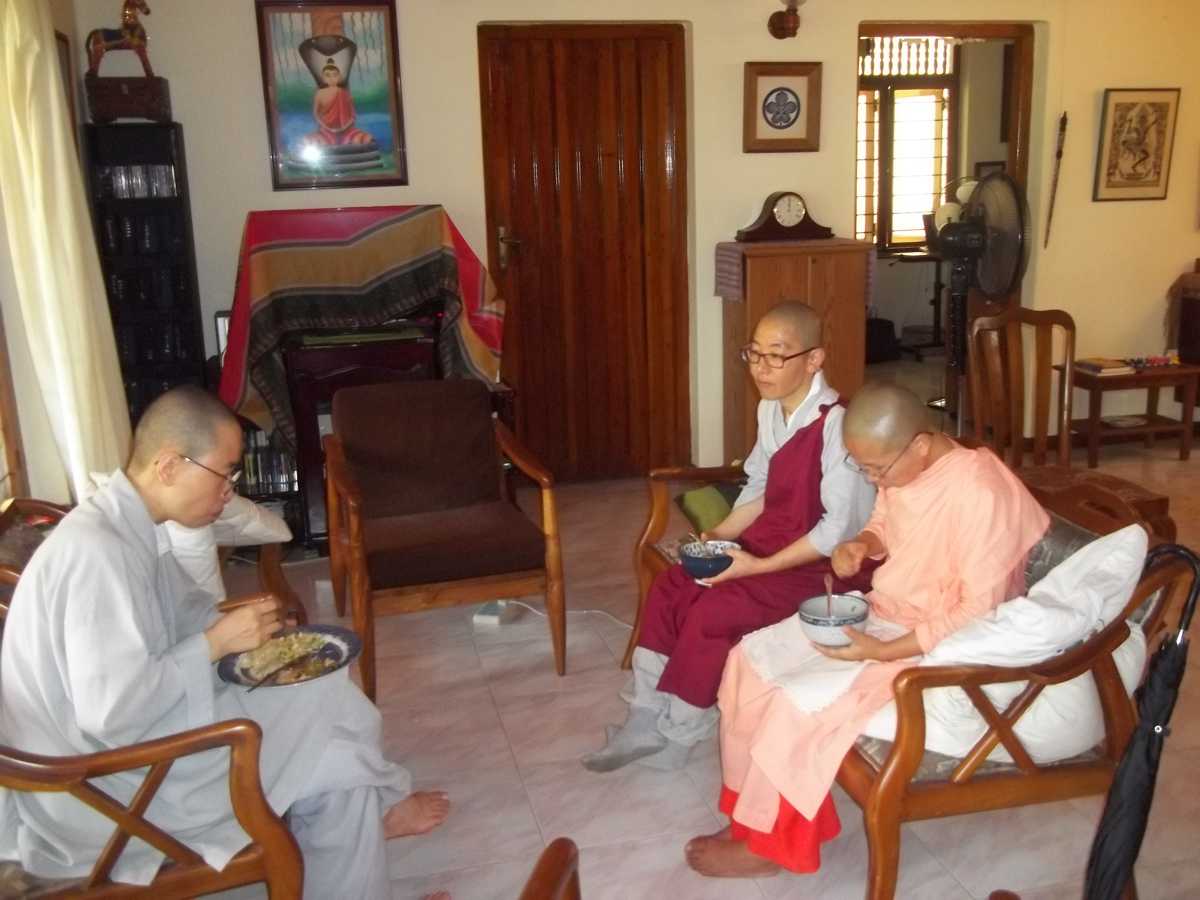 |
|||||
For being loyal customers, our Amerian Express credit card has offered us one free ticket to Male (the Maldives), Chennai, Bangalore, or Bangkok, good through June.We've never been to the Maldives, but, except for beautiful beaches, there's not much attraction, and prices, we have heard, are sky high. Indian visas costs 8000 rupees ($62) each, so that would pretty much defeat the purpose of the free ticket. We had planned to use the ticket to go to Bangkok in June, but, after the coup, we abandoned that idea. We wonder whether the situation will be settled enough to use the next ticket AmEx offers us in November. What a waste of a good ticket!
On the brighter side, Ken's sister, Nancy, is going to Japan with her husband, George, in August and has asked us to spend a week with them to meet the family in Kofu. Our nephew Ed and his wife, Izumi, will also be joining. We haven't seen any of the Japanese family since we left in 1999, so we’re looking forward to it very much. We'll have a couple nights in Tokyo, which will give us a welcome chance to meet Madoka, and Hiroshi and Hiroko who will be coming up from Osaka. Great if we could also place some of our books in bookstores in Tokyo, but that seems difficult.
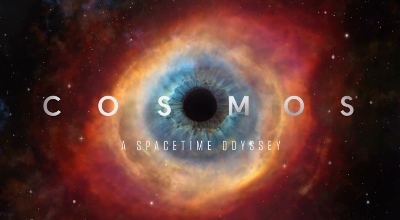 Meanwhile, here in Kandy, we are still waiting for the monsoon. It has not really rained adequately since last November. There were a few showers last month, but not enough to fill reservoirs, let alone irrigate crops. The drought is worrying: there are shortages of rice and vegetables in the offing and speculation that the tea crop is being affected. Parts of the island, however, have been experiencing horrific floods, with earthslips, mayhem, and death. Unusual weather patterns are being reported all over the world. Have we already passed the tipping point? While Neil deGrasse Tyson tried to reassure us that there is still hope, we aren't optimistic. We are doing our bit with bio-gas, (and not flying to Bangkok!), but it isn't much.
Meanwhile, here in Kandy, we are still waiting for the monsoon. It has not really rained adequately since last November. There were a few showers last month, but not enough to fill reservoirs, let alone irrigate crops. The drought is worrying: there are shortages of rice and vegetables in the offing and speculation that the tea crop is being affected. Parts of the island, however, have been experiencing horrific floods, with earthslips, mayhem, and death. Unusual weather patterns are being reported all over the world. Have we already passed the tipping point? While Neil deGrasse Tyson tried to reassure us that there is still hope, we aren't optimistic. We are doing our bit with bio-gas, (and not flying to Bangkok!), but it isn't much.
The gathering gloom and literal doom facing our environment--to say nothing of the harsh economic realities and increasingly disheartening politics--is reliably documented and quite reasonable. As far as climate change is concerned, it seems indisputable that the damage we humans have inflicted on nature will result in massive extinctions and that we're reshaping our planet in such a way that it won't be liveable, neither for us nor for most other species. A look at the record temperatures, horrific storms, and extreme floods and droughts worldwide leaves no good grounds for optimism.
 |
|
| Image: ALOKA, Journal on Buddhism |
|
The Buddha's answer to the king of Kosala was not to worry: "This dream, too, will not be fulfilled until the future. In days to come, kings will become unrighteous; the nobles will follow the king's example, and so will the brahmins. The townsmen, the merchants, and, at last, even the farmers will be corrupted. Eventually, everyone in the country, the sages and even the devas of the land will become immoral. Even the winds that blow over the realm of such an unrighteous king will grow cruel and lawless. Because even the skies and the devas of the skies over that land will be disturbed, they will cause a drought. Rain will never fall on the whole kingdom at once. It may rain in the upper districts, but in the lower it will not. In one place a heavy downpour will damage the crops, while, in another area, the crops will wither from drought. The crops sown within a single kingdom, like the rice in the one pot, shall have no uniform character. However, you have nothing to fear from this."
Lest we be comforted by the Buddha's answer, consider that we are now living in that future and have been for longer than we suspected!
We remember watching "An Inconvenient Truth" with Dr. Nandobatha and the students during the 2007 Intensive in Kolkata. The sense we had then was one of urgency--as if one's turban and hair were on fire! Recent lessons have included topics such as colony collapse syndrome in bees, extinctions, acidification of the oceans, overfishing, and climate change as the explanation for superstorms like Nargis, Sandy, and Haiyan. Our students have been challenged to see the big picture, to discuss these issues, and to apply the Dhamma to a solution.
 "Don't worry!" Ven. U Khe Min Da Sayadaw often said, although, at that time, we hadn't had a clue why. "When this world is destroyed by fire or wind or rain, no beings are lost. They all move up into the higher realms or down into the woeful states until it all starts again." Samsara is a wandering on, with periodic intermissions, during which earthly life dies off, to resume once more in a new eon.
"Don't worry!" Ven. U Khe Min Da Sayadaw often said, although, at that time, we hadn't had a clue why. "When this world is destroyed by fire or wind or rain, no beings are lost. They all move up into the higher realms or down into the woeful states until it all starts again." Samsara is a wandering on, with periodic intermissions, during which earthly life dies off, to resume once more in a new eon.
The environment is descending into chaos; we must all one day die. Nevertheless, each of us must live twenty-four hours each day, making decisions, good or bad. The Buddha urged us to strive on with diligence. It is up to each of us to act wisely and to make a determination to do the best we can until this life ends. We have many opportunities for showing honesty, kindness, and compassion. Such possibilities!